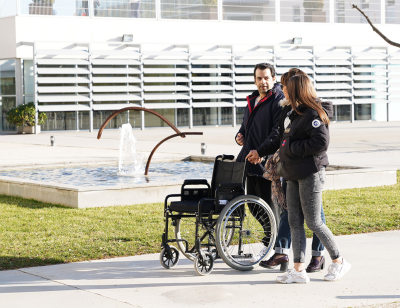In the first phase, a psychological examination is performed on both the patient and their family with the aim of designing an individualised treatment plan and gathering information to assess their evolution.
The effects of a pathology or neurological problem always have a strong biopsychosocial impact on the lives of the individuals themselves, and on the people around them. Their quality of life may be affected, as well as their psychological well-being.
Altered neurological capacities cause a significant imbalance in the individual, pose a new and often unknown reality, and generate great uncertainty for the future.
It often occurs as a consequence of a traumatic episode, which is followed by a medical process in which there might be a long period of hospitalisation and distancing from loved ones and from the lifestyle led up to that point.
If the right information and care are available during the process of adaptation to the new situation, it is easier to enjoy healthy and satisfying life experiences. In the same way, it is highly advisable to share feelings openly with the people in one’s life, integrating the acquired disability into normal life as far as possible.
The person has to grieve properly for the losses they have experienced, but it is essential that they can focus their attention away from the limitations and concentrate on potential opportunities that are presented to them so they can lead the life they want. Psychological support for their emotional needs and the people around them can contribute to their well-being and help their relationships work better.
One of the main aims of the interdisciplinary team of the Institut Guttmann is to develop people’s resilience, putting in place the mechanisms and resources needed to face the new situation.
The team of psychologists therefore evaluates and guides them, intervening both in the initial phases and in possible long-term complications.
In the first phase, a psychological examination is performed on both the patient and their family with the aim of designing an individualised treatment plan and gathering information to assess their evolution. The psychology team of the Institut Guttmann offers individual and/or family care, treatment for post-traumatic stress, relaxation techniques to control anxiety and other treatments that promote well-being and quality of life. After the hospitalisation phase, the patient has an annual visit with their referring psychologist.
References:
Dra. Soler, D. (2020) “Aprender a vivir con los cambios y retos: de qué hablamos cuando decimos resiliencia”. Revista Sobre Ruedas, 104, 29-32.
Gilabert, A. (2012). “Aspectos psicológicos en la neurorrehabilitación infantil”. Revista Sobre Ruedas, 82, 18-19.
Gilabert, A. (2021). “Resiliencia”. Revista Sobre Ruedas, 81, 8-9.




